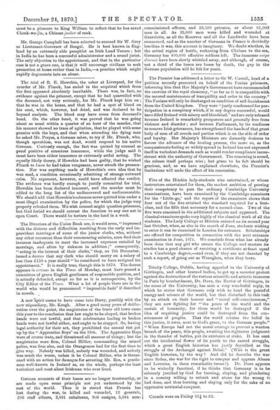The trial of R. E. Howchin, the usher at Liverpool,
for the murder of Mr. Flueck, has ended in the acquittal which from the first appeared absolutely inevitable. There was, in fact, no ,evidence against the prisoner, except that he had quarrelled with the deceased, not very seriously, for Mr. Flueck kept him on ; that he was in the house, and that he had a spot of blood on his coat, which, however, had dried, and was declared to be beyond analysis. The blood may have come from deceased's bead. On the other hand, it was proved that he was going .about as usual within a quarter of an hour of the murder, that .his manner showed no trace of agitation, that he played with some pennies with the boys, and that when attending the dying man he asked Mr. Preyss, a German usher, to try if Mr. Flueck, who, =though speeehless, was not dead, would respond to his native -German. Curiously enough, the fact was quoted by counsel as proof positive of conscious innocence, while the judge said it must have been either innocence or extremely artful acting. The -equally likely theory, if Howchin had been guilty, that he wished Flueck to know he had taken vengeance, never struck the prosecu- tion. Nor was anything made of Howchin's own idea that he was mad, a condition occasionally admitting of strange outward -calm. No argument, however, could have affected the verdict. The evidence was hardly enough to justify committal for trial, Ilowchin has been declared innocent, and the murder must be added to the long list of the undiscovered and undiscoverable. We should add that Howchin'scalmness never quitted him under a most illegal examination by the police, for which the judge very properly rebuked them. We wish counsel might question prisoners, but God forbid we should entrust the function to any one not in -open Court. There would be torture in the land in a week.


































 Previous page
Previous page